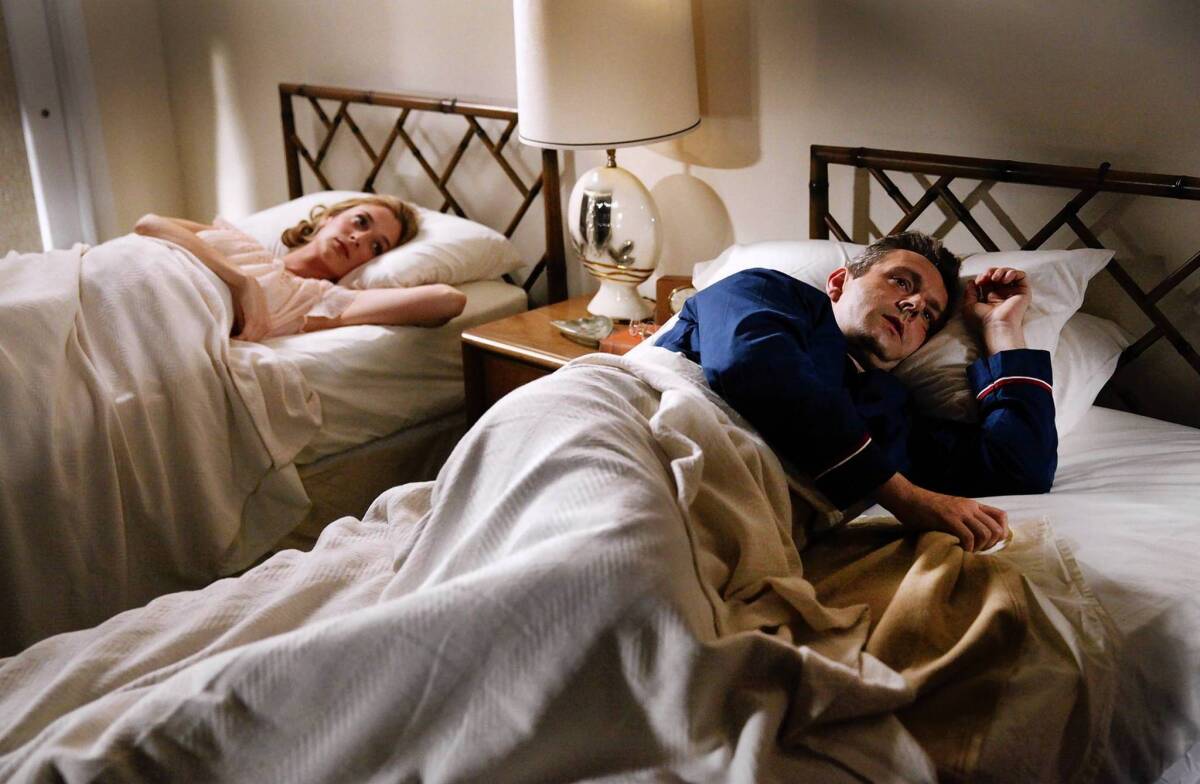Showtime’s ‘Masters of Sex’ tackles taboos

Virginia Johnson played a key role in what we call the Sexual Revolution. But she didn’t quite live to see her remarkable career turned into a TV show.
“Masters of Sex,” the series premiering this fall on Showtime, recounts the pioneering research and tangled personal lives of Johnson and her collaborator, fertility expert William Masters. Together, they began studying human sexual behavior in St. Louis in the late 1950s, when the subject was taboo in mixed company and sex therapy was virtually nonexistent.
Masters and Johnson started an affair and later married, but a typical office romance this was not. By the 1970s they were household names, oracles of hope for those who suffered from sexual dysfunction.
PHOTOS: TCA press tour 2013: The scene
Perhaps most astonishing was the fact that, unlike her research partner and future husband, Johnson had virtually no scientific training when she started studying couples in the bedroom. She happened upon sex research largely by accident after a failed career as a country singer. But she was able to persuade subjects, especially women, to open up about their private lives — something that Masters, a socially awkward doctor bent on winning a Nobel Prize, had trouble doing.
“Virginia Johnson looked like every other woman around her,” Lizzy Caplan (“Cloverfield”), who plays her in “Masters of Sex,” told reporters Tuesday at a TV press tour news in Beverly Hills. Michael Sheen, the Welsh actor who played Tony Blair in “The Queen,” portrays Masters. Added Caplan: “It’s the choices she’s made, what’s inside her, that’s different,”
What Johnson would make of her second pass at celebrity we’ll never know. She died last week at 88, having spent the last couple of decades out of the spotlight.
Thomas Maier, the author whose 2009 nonfiction book “Masters of Sex” forms the basis for Showtime’s series, said that toward the end of her life, Johnson had no interest in publicizing or explaining her controversial work, which stood alongside that of Alfred Kinsey as a pillar of mid-20th century sex research.
“Lizzy Caplan was begging to go see her, and I pleaded with her,” Maier, who had befriended Johnson during work on the book, recalled in an interview Tuesday. “She just didn’t want to do it. … It was, ‘I don’t want to be in the limelight.’ ”
Maier said he originally hoped that his book would be turned into a movie, but writer-producer Michelle Ashford had other ideas. With cable TV taking ever-greater risks with daring content, she and executive producer Sarah Timberman felt they could spin a weekly series showing how Johnson became Masters’ research partner and then his lover.
“There is a lot of material there,” Ashford told reporters.
And a lot of it is fairly explicit. In fact, “Masters” probably has the most sex and nudity of any TV series since HBO’s 2007 graphic drama “Tell Me You Love Me.” In one scene, Johnson brandishes a glass dildo about to be used on a female subject and thrusts it into the surprised face of Barton Scully (Beau Bridges), the university administrator who reluctantly underwrote their research.
The series acknowledges the awkwardness of what Masters and Johnson were doing without turning it into a joke. “If you put a dildo in front of Beau Bridges’ face, people are going to laugh,” Caplan admitted. But “we’re not really going for a joke.”
While “Masters” takes dramatic liberties at times, the producers say they’ve tried to follow the history as set out in Maier’s book.
“The research, we’ve fudged none of that,” Ashford said. “We’ve embellished some characters. But their lives were so complicated and interesting, we’ve had to embellish very little, actually.”
CRITICS’ PICKS: What to watch, where to go, what to eat
The latter part of their careers, ironically, may be harder to depict in a contemporary TV series. Although some experts have praised Masters and Johnson for correcting flawed traditional notions about sex — overturning Freud’s ideas about female orgasm, for example — they were also heavily criticized for some views that seem backward or discredited now. For example, they argued that gay people could be “converted” to heterosexuality.
“It was a bit of a misstep,” Ashford said of Masters and Johnson’s gay theory. “It was a complicated story, though, why they came down that way and proposed gay conversion. It’s a fascinating story. If all goes well, we’ll get to tell it.”
Caplan hopes that people will see Johnson as she does: a feminist hero.
“What got her to the point in her life that she reached, you know, the pinnacle of her career,” she said, “was [that] she was able to move forward and not necessarily be tied down by what would be considered society’s moral rules.”
More to Read
The complete guide to home viewing
Get Screen Gab for everything about the TV shows and streaming movies everyone’s talking about.
You may occasionally receive promotional content from the Los Angeles Times.







